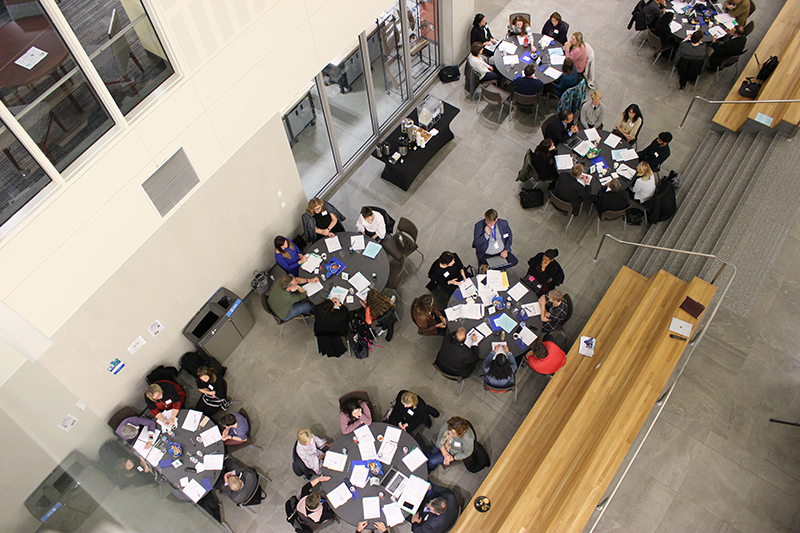Staff split on Board’s reopening decision
The Reopening Advisory Board’s decision to move to 50% hybrid in January has divided some staff members.
On Dec. 1, the New Trier Board of Education voted to postpone instating a 50% in-person hybrid model until the start of second semester. Instead, the school will continue with its current 25% hybrid plan.
Board members also approved Superintendent Paul Sally’s recommendation to expand the E-track, increasing the number of struggling students offered in-person instruction.
Staff have mixed feelings regarding the Board’s decision. Some, like Assistant Superintendent for Special Education Joanne Panopoulos, are enthusiastic about preparing for the 50% hybrid model and implementing the expanded E-track. A member of the school’s Reopening Advisory Board, Panopoulos believes that it is important to allow as many students as possible to attend in-person classes, as long as mitigation efforts are continued.
Trish Loftus, a Kinetic Wellness teacher, is also excited about the possibility of bringing more students back in the building.
“As a teacher, my goal is to make connections with all my students. This has been the biggest challenge thus far,” said Loftus. “I’ve adapted, but I’m looking forward to having a normal school day.”
However, some staff members feel that the school’s hybrid model poses problems that the fully-remote model does not.
Social Studies teacher Lindsay Arado acknowledged the challenge she and other staff members are facing to cultivate community in the classroom. However, she didn’t believe expanding the hybrid model would change this.
“When we simultaneously teach students in the classroom and students on Zoom, I don’t think we’re doing right by our students,” said Arado.
“As someone who takes their profession very seriously, it’s really hard to feel like I’m doing a crappy job a lot of the time.”
Panopoulos agreed that hybrid poses challenges to teachers, but thought the school’s administration was doing an adequate job mitigating them.
“Moving to a hybrid teaching environment has been a seismic shift for our teachers, support staff and students,” said Panopoulos.
“[The administration] has provided a lot of support and extensive training. These changes may be difficult, but we know that the more time we spend in the hybrid environment, the better we can make it for everyone.”
The Board’s decision to gradually move towards the 50% hybrid model comes at a time when COVID cases are surging throughout the country. In the New Trier township, the seven day rolling positivity rate has consistently been in the upper 200s per 100k people; the determined threshold of concern is 100 new cases per 100k people.
The situation is more dire in teacher zip codes—the seven day positivity rate hasn’t dipped below 400 cases per 100k people in the last three weeks.
Some members of the staff believe that the benefits outweigh the risks.
“The Reopening Advisory Board’s work is centered around students and what’s best for them. While our priority is to provide a healthy and safe environment for our students and staff, we know many students benefit from learning in person and for those students we need to be sure we have our highly trained faculty and staff to provide their instruction,” said Panopoulos.
Other teachers are less optimistic about the second semester 50% hybrid plan, citing concerns about increasing COVID-19 positivity rates.
Arado believes that the Reopening Advisory Board was hasty in making the decision to move to the 50% hybrid model so far in advance of second semester.
“I hope that the administration doesn’t move forward with the plan unless community metrics support that—not just the metrics revealed by the saliva test,” explained Arado.
“At the beginning of December, I don’t think they should make a decision that by the middle of January we’re going to be ready to go to 50%. We don’t have a good grasp of what positivity rates will look like that far in advance.”
Some staff members are critical of the community coalitions rallying for the complete reopening of the building, like Open New Trier and New Trier Neighbors.
Arado explained that the rhetoric of such organizations can be harmful when it targets teachers specifically.
“We want to be back in the building when it’s safe to be in the building. The idea that teachers are obstructionists, or are just trying to get out of work is so hurtful,” said Arado. “This is my 19th year of teaching, and I’ve never worked as hard.”
However, Arado empathizes with the root of community members’ frustrations.
“I think most parents are really appreciative of teachers and I think they recognize how hard we’re working.”
“But this pandemic causes so much stress and anxiety. Being able to focus on teachers specifically as an obstacle helps make something tangible that is really intangible.”









































